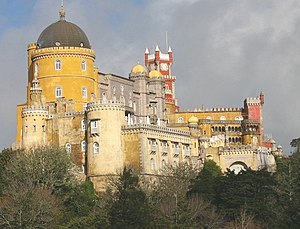Neorromantismo
Este artigo ou se(c)ção está a ser traduzido. |
Esta página ou seção foi marcada para revisão devido a incoerências ou dados de confiabilidade duvidosa. (Janeiro de 2010) |

O termo neorromantismo é utilizado para definir uma variedade de movimentos na filosofia, literatura, música, pintura e arquitetura, assim como movimentos sociais que existem depois e incorporam elementos da era do Romantismo. Tem sido usado como referência a compositores do final do século XIX e começo do século XX, tal como Richard Wagner particularmente por Carl Dahlhaus que descreve como "um florescimento tardio do romantismo numa época positivista". Ele considera como um sinônimo de "a era de Wagner, em cerca de 1850 até 1890—o começo da era do modernismo, cujos primeiros representantes eram Richard Strauss e Gustav Mahler, sendo aplicado também a compositores contemporâneos que rejeitaram ou abandonaram o uso de técnicas do modernismo avant-garde.
Reino Unido
1880 - 1910
- Gerard Manley Hopkins
- Lewis Carroll
- John Ruskin
- Edward Elgar
- Vaughan Williams
- Movimento estético
- Arts & Crafts
- William Morris News from Nowhere
- Simbolismo
- W.B. Yeats
- Rudyard Kipling Puck of Pook's Hill[1]
- Alfred Edward Housman[2]
- Neogótico
- Pictorialismo
Europa
- Simbolismo (pan-Europeu)
- Odysseus Elytis (Grécia)
- Bernard Faucon (França)
- Balthus (França/Suíça)
- Sigurdur Nordal (Islândia)
- Vicente Aleixandre (Espanha)
- Agustina Bessa-Luís (Portugal)
- Anton Bruckner (Áustria)
- Iris van Dongen (Holanda)
- Wandervogel (Alemanha)
- Arthur Schopenhauer (Alemanha)
Polónia
Rússia
Estados Unidos da América
- Walt Whitman
- Imagists
- Maxfield Parrish
- Allen Ginsberg
- The beat generation
- Minor White
- Joseph Cornell
- John Crowley
- Guy Davenport
- Justine Kurland
- Jeffrey Blondes
- Hakim Bey - Zona Autônoma Temporária[3]
Neorromantismo como movimento musical
- A Flock Of Seagulls
- ABC
- Adam and The Ants
- Après Demain
- Blancmange
- Classix Nouveaux
- Culture Club
- Duran Duran
- Eurythmics
- The Flowers Of Romance
- Human League
- Japan
- Kajagoogoo
- Lime
- Modern English
- Naked Eyes
- Orchestral Manoeuvres In The Dark
- Organ
- Payolas
- Simple Minds
- Soft Cell
- Spandau Ballet
- Spoons
- Strange Advance
- Talk Talk
- Tears For Fears
- Ultravox
- Vennaskond
- Visage
Referências
Bibliografia
- David Mellor. Paradise Lost: the neo-Romantic imagination in Britain, 1935 - 1955. (1987).
- Peter Woodcock. This Enchanted Isle - The Neo-Romantic Vision from William Blake to the New Visionaries (2000).
- Malcolm Yorke. The Spirit of Place - Nine Neo-Romantic Artists and Their Times (1989).
- Michael Bracewell. England Is Mine (1997).
- Peter Ackroyd. The Origins of the English Imagination (2002).
- P. Cannon-Brookes. The British Neo-Romantics (1983).
- Corbett, Holt and Russell (Ed's.) The Geographies of Englishness: Landscape and the National Past, 1880-1940 (2002).
- Graham Arnold. The Ruralists - A Celebration (2003).
- Christopher Martin. The Ruralists (An Art & Design Profile, No. 23) (1992).
- S. Sillars. British Romantic Art and The Second World War (1991).
- Trentmann F. Civilisation and its Discontents: English Neo-Romanticism and the Transformation of Anti-Modernism in Twentieth-Century Western Culture (1994, Birkbeck College).
- Edward Picot. Outcasts from Eden - ideas of landscape in British poetry since 1945 (1997).
- Hoover, Kathleen and Cage, John. Virgil Thompson: His Life and Music (1959).
- Albright, Daniel. Modernism and Music: An Anthology of Sources (2004).

